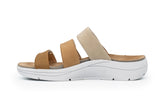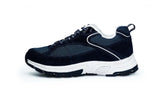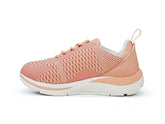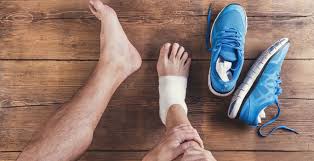Choosing the Right Shoes for Your Feet
When it comes to footwear, picking the right pair of shoes is not just about style; it's about comfort, health, and overall well-being. The shoes you choose can significantly affect your daily comfort and long-term foot health. With the vast array of options available, it can be overwhelming to choose the right shoes for your feet. This guide aims to simplify the process, making it easier for you to navigate the myriad choices and find what truly suits your needs.
In this guide, we'll explore the importance of selecting the right footwear, especially for those with specific needs such as diabetes, and offer tips to ensure you make the best choice for your feet. By understanding your foot type and considering both the function and style of shoes, you can make informed decisions that enhance your comfort and health. We will also touch on specialty shoes for various needs and offer tips for proper foot care, ensuring your feet remain healthy and happy for years to come.
With supportive, well-fitted shoes—like those available at DiabeticShoe.in—you’ll not only protect your feet but also improve your posture, mobility, and confidence. So the next time you lace up, remember: your feet deserve more than just fashion—they deserve care.
Understand Your Foot Type
Before you embark on finding the perfect shoes, it's crucial to understand your foot type. Each foot is unique, and knowing whether you have flat feet, high arches, or a neutral arch can significantly impact the kind of support you need. This knowledge will guide you in selecting shoes that not only fit well but also support your foot's natural structure and movement.
Identifying your foot type can be as simple as a wet test, where you step on a piece of paper with wet feet to see the imprint. This can reveal whether you have flat feet, high arches, or a neutral arch. Consulting with a podiatrist or footwear specialist can also provide insights into your foot type and help you make the best footwear choices.
• Flat Feet: Stability and Support Are Essential

People with flat feet have little to no arch. This condition can cause feet to roll inward when walking, which may lead to strain and discomfort. Over time, this can result in issues like plantar fasciitis or knee pain due to the misalignment of the foot and leg. Shoes with good arch support and stability features are ideal for flat feet.
For those with flat feet, it's important to prioritize shoes that provide structured support and minimize inward rolling. Look for shoes with built-in arch support, firm midsoles, and a supportive heel counter. Orthotic inserts can also be beneficial, providing additional support and comfort tailored to your specific needs.
• High Arches: Cushioning Is Key

High arches mean that there is a significant gap between the floor and the foot's arch. This foot type can lead to excessive pressure on the heel and ball of the foot. Without adequate support, individuals with high arches may experience discomfort or pain during prolonged standing or physical activity. Cushioned shoes that provide good shock absorption are recommended.
To alleviate stress on high arches, seek shoes with ample cushioning and a flexible sole to absorb shock. Inserts designed for high arches can offer extra support, distributing pressure more evenly across the foot. Regular stretching and strengthening exercises can also help maintain foot health and prevent discomfort.
• Neutral Arch: Balanced, But Don’t Neglect Support
If you have a neutral arch, your feet are well-balanced. This foot type usually experiences fewer problems, but even so, it's important to choose shoes that offer good support and cushioning to maintain comfort during activities. Ensuring your footwear supports your natural arch and provides adequate shock absorption is key to preventing future issues.
For those with a neutral arch, a wide variety of shoe types may be suitable. However, it's still crucial to prioritize comfort and support, particularly if you spend long periods on your feet or engage in high-impact activities. Regularly reassessing your shoe needs as your activity level or foot health changes is a wise practice.
Why Proper Shoes Matter—Especially for Diabetics

Wearing the right shoes can prevent a host of foot problems, including blisters, calluses, and more serious conditions like bunions and plantar fasciitis. Ill-fitting shoes can exacerbate these issues, leading to chronic pain and discomfort. Moreover, for individuals with diabetes, selecting appropriate footwear is vital to avoid complications like foot ulcers and infections.
Proper footwear acts as a foundation for the entire body, influencing posture, balance, and overall mobility. Shoes that fit well and provide the right support can enhance your quality of life, reducing the risk of injuries and promoting healthy foot function. Investing in the right pair of shoes is an investment in your overall health.
Diabetic Shoes: Designed for Protection and Comfort
Diabetic shoes are specially designed to minimize the risk of skin breakdown in diabetics with pre-existing foot disease. They often feature:
-
Extra Depth: To accommodate foot deformities and prevent pressure points
-
Seamless Interiors: To prevent rubbing and irritation that can lead to blisters or ulcers
-
Breathable Materials: To maintain a healthy foot environment, reducing the risk of fungal infections
For diabetics, the right footwear is not just about comfort but also about preventing serious health complications. At DiabeticShoe.in, we offer specialized diabetic footwear that incorporates these features and more. Regular visits to a podiatrist can ensure that your footwear remains suitable as your needs change. Additionally, custom orthotics can provide personalized support, further minimizing the risk of foot problems.
Sizing and Timing: When and How to Buy Shoes
Feet size can change over time, so it's important to measure your feet each time you buy new shoes. Weight changes, pregnancy, and age can all affect foot size and shape. Ensure that you measure both feet, as one is often slightly larger than the other, and choose shoes that accommodate the larger foot for optimal comfort.
Feet tend to swell during the day, so it's best to shop for shoes in the afternoon when your feet are at their largest. This ensures that your shoes will fit comfortably all day long. Trying shoes on later in the day can prevent buying a pair that might feel too tight or cause discomfort after a few hours of wear.
Fit Over Fashion: Always
Choose shoes that conform to the shape of your foot. Avoid shoes that are too tight or too loose, as they can cause discomfort and lead to foot issues over time. Pointed shoes or styles that squeeze the toes can lead to bunions and other foot deformities, so prioritize a comfortable fit.
When trying on shoes, walk around to ensure they fit well. There should be enough room to wiggle your toes, and your heel should not slip out when walking. Pay attention to any areas that feel tight or uncomfortable, as these can lead to blisters or long-term issues if not addressed.
Athletic and Orthopedic Shoes: Functional Footwear for Specific Needs
While it's tempting to choose shoes based on appearance, comfort should always take precedence. A stylish shoe is of little use if it causes pain or discomfort. Many brands now offer stylish options that do not compromise on comfort, allowing you to have the best of both worlds.
For those who engage in physical activities, investing in quality athletic shoes is crucial. These shoes are designed to provide support, stability, and cushioning needed for various sports and exercises. The right athletic shoe can enhance performance, reduce injury risk, and improve comfort during activity.
Athletic shoes are not one-size-fits-all; different sports require different shoe features. Runners may need shoes with excellent shock absorption, while basketball players might prioritize ankle support. It's important to consider the specific demands of your chosen activity when selecting athletic footwear.
Orthopedic shoes are specifically designed to support or accommodate the mechanics and structure of the foot, ankle, and leg. They are ideal for individuals with specific foot issues or conditions like arthritis. These shoes often include features such as extra cushioning, arch support, and custom orthotics.
For those with foot pain or deformities, orthopedic shoes can provide significant relief and improve mobility. They can be customized to address specific medical conditions, ensuring that your footwear supports your health and well-being. At DiabeticShoe.in, we provide orthopedic solutions that blend medical support with everyday comfort.
Daily Foot Care: Your Shoes Can Only Do So Much
Choosing the right shoes is just one aspect of foot care. Maintaining healthy feet involves regular cleaning, moisturizing, and checking for any signs of issues. Simple routines can prevent common problems and keep your feet in top condition. For diabetics, daily foot inspections are crucial to catch any problems early.
Engaging in foot exercises can improve flexibility and strength. Simple activities like toe curls, ankle rotations, and foot stretches can make a significant difference in foot health. These exercises can be done at home with minimal equipment and can help prevent injuries and improve overall foot function.
Maintaining proper nail care is essential for overall foot health. If you're unsure how to properly trim your nails or if you have difficulty reaching your feet, consider visiting a professional for regular pedicures. This can prevent problems and ensure your nails and feet remain healthy.
The Journey to Happy Feet Starts with the Right Pair
Choosing the right shoes is more than a shopping decision—it’s a lifestyle choice that directly impacts your health and comfort. Whether you're dealing with diabetes, arch-related issues, or just looking for all-day comfort, understanding your foot type and needs is the first step.








